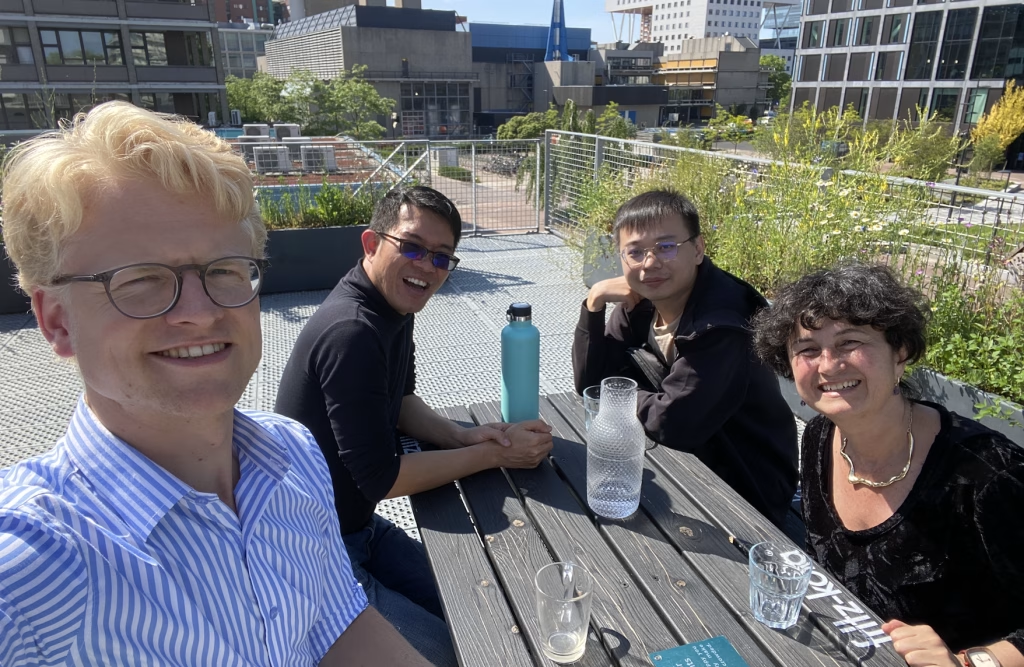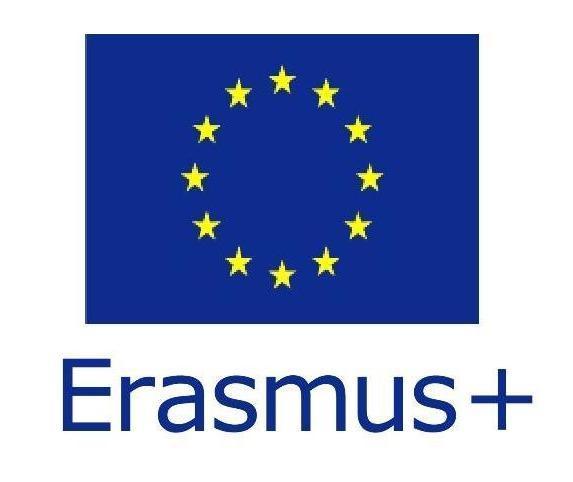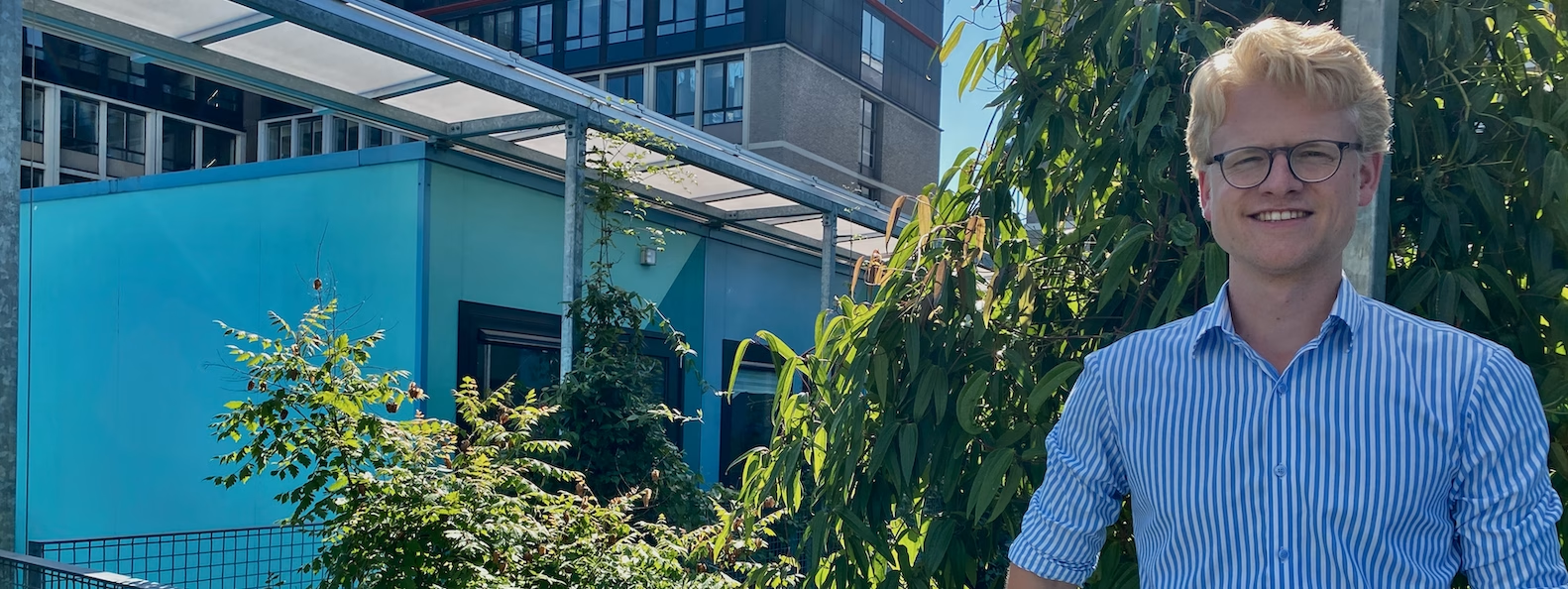How successful , innovative, digitally skilled and entrepreneurial are alumni of EURIDICE’s educational programs? This is a question often posed to us in various surveys by the European Commission, which the EU wants to know, as part of the common vision and policy for the Digital Decade. The Digital Europe Programme is designed to make this happen. EURIDICE adds Digital Humanism and Global Citizenship. Is this a promising approach? The first results are very promising.
Amsterdam, May 30, 2025 – we meet Tom Siebring, who started as a young digital entrepreneur, together with two business partners, and is now successfully leading a start-up named Caddy Software BV. Caddy is based at the VU’s StartHub incubator. While talking to Tom, we are sitting at the building’s rooftop, (which has actively been regreened by VU) and we enjoy the sun, while discussing responsible entrepreneurship in the digital society.
Tom did his computer science master research project in the framework of EURIDICE and graduated in 2024 at VU. His master research project, titled Rain Detection in the West African Sahel using Deep Learning on Satellite Imagery, was also one of the many flagship student projects in our longstanding research programme W4RA. And it was an example for the Collaboratorium approach. Tom also briefly worked remotely with our consortium partner UPEC, at LACL, the Laboratory of Algorithms, Complexity and Logic, and had access to UPECs big data infrastructure, but he decided to buy a powerful work station at the end and do training of the algorithms himself. This is matches his independent style and mindset.
Tom is a versatile person. He starts his day early, dedicating three hours to reading before work. “I’m reading 50 books a year now,” he says with a smile. “I’ll soon surpass Bill Gates, who claims 80 books per year.” For Tom, books offer not just knowledge but also fresh ideas, essential for broadening an innovator’s horizons. Personal interactions are equally important. He recalls how Steve Jobs once envisioned a central restroom hub at Apple’s headquarters, designed to encourage informal encounters and spontaneous conversations. Though the idea was ultimately deemed impractical for staff needs, the underlying principle was clear: innovation begins with dialogue and chance meetings. (This spirit of serendipitous connection, unfortunately, has been diminished at VU, where researchers are now placed behind closed department doors, making them less accessible to students and others.)
During his study, Tom participated in our collaboratorium pilot weekly research dialogues, with actively discussing, presenting and practicing in our W4RA-style Community of Discourse. While completing his master’s research in 2024, Tom transitioned into entrepreneurship.
How does Tom work as a business developer? In my business I need to talk to customers, build relationship and trust. Sending emails or making random phonecalls does not work. You need to meet people. Once you have their attention, you must invest in time and focus. Our best project started with a simple picture of a sticker on a traffic sign in Amsterdam. It took many attempts to connect with the right people and build trust. But eventually, we succeeded in establishing a strong relationship. We are providing them with our SaaS, which they find a usefull add-on, carefully design to meet their specific requirements, but the point is how to get there. Software as a Service (SaaS), in that sense, provides us with a good business model. You don’t need high upfront investments — only our technical and social/business skills — to start with the business. In that sense I say: everyone can become a business person.
The proximity of the VU campus to a large pool of computer science students is a valuable asset for Caddy Technology. We offer students the opportunity to gain hands-on experience through internships, providing not only technical training but also exposure to real-world business practices. While outsourcing to software engineers in countries like Nigeria and India is an option when additional capacity is needed, it often proves challenging. Effective software development typically requires close collaboration—ideally working together in the same room, or at least having a strong, well-established relationship. Online meetings can be difficult, both in terms of communication and in maintaining motivation to deliver high-quality work.
The StartHub is a striking green container-block structure situated on the VU campus square. Renting a cubicle here comes at a high price: 650 EUR per month, which, as Tom notes, is not an easy commitment for a startup. Fortunately, they were lucky to secure some early-stage projects that helped to manage these costs. Tom shares that Caddy is committed to fair and responsible entrepreneurship. The company has an arrangement in place to share equity with all staff members, also new staff who will join in the future. Also temporary staff and interns receive fair compensation for their contributions.
Our conversation with Tom drifts from start-up journey to broader topics such as AI and global digital transitions.
My two academic guests, Cheah WaiShiang (associate professor at UNIMAS, the University of Malayisa Sarawak, also member of the EURIDICE family), and software engineer Sim, who are on currently on an ERASMUS study visit at VU, and worked with me, Hans Akkermans, Victor de Boer and André Baart on ICT4D research and education since 2014, engage with Tom in an interesting conversation about present and future of the digital society, new opportunities and risks of AI, and the differences in the digital transition between Malaysia and the Netherlands.
Tom already knew Dr. Cheah during the master’s when Tom was in one of the student groups of my course ICT4D in the Field. With a team he designed a socio-technical software solution for teachers in Sarawak called Lemon Teacher.
Cheah pointed at the upcoming opportunities in Asia. Sarawak has now free education at all levels, and a prestigeous new AI research institute. The business climate for digital innovation is great in South-East Asia and specifically in Malaysia Sarawak. Cheah invited us to come to Kuching a few days. Tom could give a lecture to UNIMAS students in how to do succesful & responsbile entrepreneurship. Maybe this will expand and make Caddy Software BV go Global?
This lively interview with Tom Siebring offers another compelling narrative of the opportunities for young entrepreneurs trained in the mindset of interdisciplinarity, collaboration, and reflection, which are hallmarks of the EURIDICE Digital Society and Global Citizenship’s collaboratorium concept. To be continued…

The study visit by educational staff for this event was partially funded by ERASMUS.

